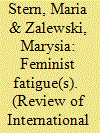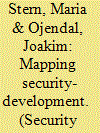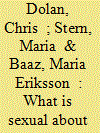|
|
|
Sort Order |
|
|
|
Items / Page
|
|
|
|
|
|
|
| Srl | Item |
| 1 |
ID:
170392


|
|
|
|
|
| Summary/Abstract |
Marysia Zalewski's work has taught us, as a collective of feminist scholars, to be cautious of neat instruction manuals and coherently set out plans of action; of claims to sure knowledge about danger, violence, and its subjects and remedies; of the fanfare of grand arrivals; and of the quieter staking of ground that has been seemingly won. Zalewski has persistently reminded us in different ways that we/she does ‘not even know what gender is or does’. Far from a flippant response to the emptiness of gender mainstreaming policies, this seemingly simple statement instead serves as a glaring post-it note on the margins of our texts about International Relations theory, feminism, sex/gender and violence— both those that we read, as well as those that we write. However, this lesson is often forgotten in our rush to understand and establish gendered harms as valid and important, and to seek their redress. Gleaning insights from Zalewski's work, this article critically considers possible responses to the 2018 Nobel Peace Prize. Its aim is not to delve into a discussion of the politics or effects of the Peace Prize as such, but to instead use the 2018 Peace Prize as a marker—a moment to consider the possibility for critique in relation to sexual violence.
|
|
|
|
|
|
|
|
|
|
|
|
|
|
|
|
| 2 |
ID:
124066


|
|
|
|
|
| Publication |
2013.
|
| Summary/Abstract |
This article addresses an underreported aspect of contemporary warring in the Democratic Republic of Congo (DRC): the experiences of women soldiers and officers in the Congolese national armed forces (Forces Armées de la République Démocratique du Congo [FARDC]). It thus addresses an empirical gap in scholarly and policy knowledge about female soldiers in national armies on the African continent, and the DRC in particular. Based on original interviews, the article explores the way female soldiers in the FARDC understand their identities as "women soldiers" and offers new insight into women soldiers' role and responsibilities in the widespread violence committed against civilians in the DRC. Moreover, it explores how their understanding of themselves as "women soldiers" both challenges and confirms familiar notions of the army as a masculine sphere. Such insight is important for better understanding the gendered makeup of the military and for contributing to a knowledge base for Security Sector Reform in this violent (post)conflict setting.
|
|
|
|
|
|
|
|
|
|
|
|
|
|
|
|
| 3 |
ID:
090358


|
|
|
|
|
| Publication |
2009.
|
| Summary/Abstract |
In this article we critically consider the idea that feminism has performatively failed within the discipline of International Relations. One aspect of this failure relates to the production of sexgender through feminism which we suggest is partly responsible for a weariness inflecting feminist scholarship, in particular as a critical theoretical resource. We reflect on this weariness in the context of the study and practice of international politics - arenas still reaping the potent benefits of the virile political energies reverberating since 9/11. To illustrate our arguments we re-count a familiar feminist fable of militarisation - a story which we use to exemplify how the production of feminist IR is 'set' up to 'fail'. In so doing we clarify our depiction of feminism as seemingly haunted by its inherent paradoxes as well as explaining why it matters to discuss feminism within the locale of the academic study of international politics. We conclude with a consideration of the grammar of temporality that delimits representations of feminism and move to recast feminist failure as aporetic and concomitantly implicated in the process of intervening politically.
|
|
|
|
|
|
|
|
|
|
|
|
|
|
|
|
| 4 |
ID:
104028


|
|
|
|
|
| Publication |
2011.
|
| Summary/Abstract |
The critical and considered response by Simon Reid-Henry (2011) reinforces our sense that the widespread attention being given to the 'security-development nexus' in the realm of policy warrants careful and critical scrutiny. Perhaps most significantly, Reid-Henry's review article draws attention to the need to engage in the difficult - and often overlooked - questions of methodology: how can we creatively study the different ways in which the 'nexus' is being practised, negotiated and resisted in distinct sites - and to what effect? His comments therefore add much to our collective (yet necessarily disparate) efforts to develop an array of creative methodologies for the study of the 'nexus'. Continuing the spirit of constructive critique, we engage with some of his main lines of argument. It is vital, we believe, to remember that there are many ways of exploring the politics of security-development, each requiring different road maps. Furthermore, as Véronique Pin-Fat reminds us, even the astute and committed pursuance of any given map may blind us to 'finding' what we are looking for.
|
|
|
|
|
|
|
|
|
|
|
|
|
|
|
|
| 5 |
ID:
094754


|
|
|
|
|
| Publication |
2010.
|
| Summary/Abstract |
It is now beyond doubt that attention to the 'security-development nexus' has become commonplace in national and global policymaking. However, how 'the nexus' is differently imbued with meaning and ultimately employed remains underexplored. In this article, we suggest a possible framework for mapping the multiple understandings that underlie specific articulations of 'the nexus' in order to reveal the ways in which meaning may shift in different (yet seemingly similar) discourses. To this end, we draw upon familiar stories about 'development' and 'security', and we offer a brief reading of ways in which 'the nexus' is articulated in policy texts. Ultimately, this framework may hint at what such articulations may imply for the policy agenda.
|
|
|
|
|
|
|
|
|
|
|
|
|
|
|
|
| 6 |
ID:
109464


|
|
|
|
|
| Publication |
2011.
|
| Summary/Abstract |
The increasing privatization of security and the changing patterns of security governance call into question the foundational lines of demarcation between the "public" and "private." This article investigates how key actors in the security assemblage at Stockholm-Arlanda Airport make sense of their roles in relation to public-private distinctions. While central to the ways in which security actors understand themselves and each other, closer inspection reveals that the drawing of these lines is also highly ambivalent and contested-in relation to questions of control and regulation, authority, as well as security rationalities. Further, "private-private" and "public-public" contestations also are informed by the obdurate public-private distinction.
|
|
|
|
|
|
|
|
|
|
|
|
|
|
|
|
| 7 |
ID:
061465


|
|
|
|
|
| Publication |
Jan-Mar 2005.
|
|
|
|
|
|
|
|
|
|
|
|
|
|
|
|
| 8 |
ID:
072545


|
|
|
|
|
| Publication |
2006.
|
| Summary/Abstract |
One way of exploring the paradox of (in)security and its implications for the reproduction of violence is to inquire into how the promise of a secure subject is inscribed in discourses of (in)security. Why is the successful securing of 'we' impossible? How might the supplementary relationship between security and insecurity inform the inscription of 'we' as the sovereign subject of security? Arguably, integral to the promise of an assured security is the concealment of the impossibility of fulfilling this very promise. This article aims to closely examine how a specific 'we', as the 'subject' of security, is constructed. Reading from the (in)security narratives of Mayan women - narratives that reflect the lived experiences of marginalized peoples struggling for security in resistance - it explores how the inscription of a specific and multiple identity, 'Mayan women', as the subject of security enacts and resists many of the dangers of securitizing identity that seem to be attendant to modern logics or grammars of security. Looking at how the impossible promise (or the ultimate failure) of securing identity plays out in a particular site among people whose voices are not often heard in writings on security invites reflection over failure as an opening for rethinking (in)securing identity.
|
|
|
|
|
|
|
|
|
|
|
|
|
|
|
|
| 9 |
ID:
174629


|
|
|
|
|
| Summary/Abstract |
Despite the prominent attention that the problem of conflict-related sexual violence (CRSV) has recently garnered globally, we still know far too little about what is sexual about sexual violence, according to whom, as well as why and how this matters in our efforts to prevent and redress its harms. A growing theoretical, political, legal and ethical imperative to ask questions about the sexual part of sexual violence across both war and peace is nonetheless emerging. This article therefore turns to the accounts of male and female survivors of CRSV at the at the Refugee Law Project (RLP) in Kampala, Uganda. In our reading of their accounts, we explore how the participants understand the possible imbrication of the perpetrator's sexual desire and pleasure with the violence they inflicted, as well as how they deem such intermeshing impossible or deeply problematic in and to the gendered frames that govern how they think about the distinctions between violence and sex, as well as themselves as sexual, social, embodied subjects. Read together, these conflicted and conflicting testimonies offer a vantage point from which to rethink some of the reductive truisms that persist in dominant policy-friendly accounts of wartime sexual violence—namely that such violence is about power and not about ‘sex’. The participants’ accounts thus urge us, as scholars and policy advocates, to resist reducing the multi-layered experiences of victim/survivors of sexual violence to fit into the palatable narratives of victimhood that prevail in humanitarian, juridical and policy spaces.
|
|
|
|
|
|
|
|
|
|
|
|
|
|
|
|
| 10 |
ID:
108445


|
|
|
|
|
| Publication |
2011.
|
| Summary/Abstract |
The global attention focused on sexual violence in the DRC has not only contributed to an image of the Congolese army as a vestige of pre-modern barbarism, populated by rapists, and bearing no resemblance to the world of modern armies; it has also shaped gender and defence reform initiatives. These initiatives have become synonymous with combating sexual violence, reflecting an assumption that the gendered dynamics of the army are already known. Crucial questions such as the 'feminization' of the armed forces are consequently neglected. Based on in-depth interviews with soldiers in the Congolese armed forces, this article analyses the discursive strategies male soldiers employ in relation to the feminization of the army. In the light of the need to reform the military and military masculinities, the article discusses how globalized discourses and practices render the Congolese military a highly globalized sphere. It also highlights the particular and local ways in which military identities are produced through gender, and concludes that a simple inclusion of women in the armed forces in order to render men less violent might not have the pacifying effect intended.
|
|
|
|
|
|
|
|
|
|
|
|
|
|
|
|
|
|
|
|
|